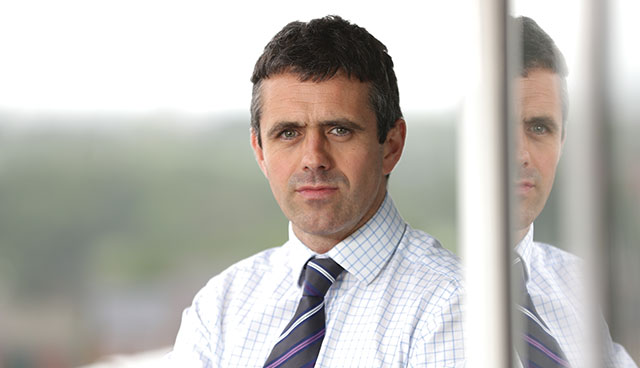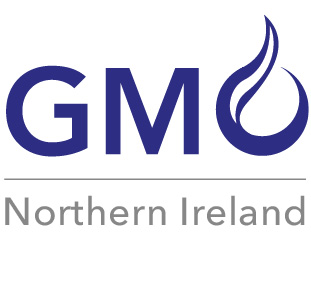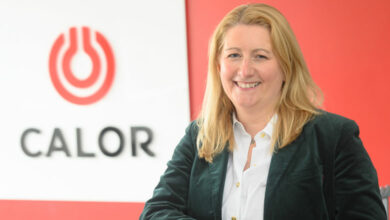TSOs launch new ‘one stop shop’ for commercial activities

A completely new energy organisation ‘GMO Northern Ireland’ has recently taken its place among all the other players in Northern Ireland’s energy infrastructure community. The ‘GMO’ stands for Gas Market Operator and the new company is a contractual arrangement between the four existing Gas Transmission System Operators (TSOs): Premier Transmission Limited, Belfast Gas Transmission Limited, West Transmission Limited and GNI (UK) Ltd. GMO NI formally launches this month.
To find out more about the venture and its plans for the future, agendaNi spoke to GMO NI’s recently appointed General Manager Mark Raphael.
What is the background to the establishment of GMO NI and what is the intended purpose of the new organisation?
“GMO NI is a collaboration of the four gas Transmission System Operators in Northern Ireland. The purpose is to provide a ‘one stop shop’ for the commercial operational activities of the TSOs, which can otherwise be described as operating the gas market. The idea of some form of Northern Irish single system operator which could deliver certain aspects of European compliance and deliver streamlining efficiencies stemmed from the Utility Regulator and was put into practice after consultation with industry. Currently in Northern Ireland the four TSOs each have their own network code which governs the commercial arrangements, there are two IT systems which the network users (also known as suppliers/shippers) interact with on a day to day basis and there are two entities which these users must engage with, often carrying out similar tasks with each party. The idea of GMO NI is to streamline all these commercial arrangements in Northern Ireland at the transmission level.”
What will be the routine main functions and responsibilities of GMO?
“GMO NI will consist of a small team acting on behalf of all the TSOs as a central entity and will manage and administer both the new single NI Network Gas Transmission Code and single IT system which Northern Ireland gas transmission network users will interact with on a daily basis. This streamlining should provide cost efficiencies in terms of avoiding duplication of effort and IT infrastructure, whilst heightening the overall engagement experience for both users and other external industry stakeholders.”
Explain the difference between a commercial/administrative role and actual physical operation?
“When we talk about a commercial/administrative role we mean the rules and charges associated with the transport of the gas through the network by the network users, whereas the physical operation includes the physical flow of the gas by the TSOs and the management of the actual physical assets in the ground. Obviously, there is a link, as essentially network users are bringing gas into and taking gas out of the network on a daily basis and therefore advise the TSOs what they wish to do, and the TSOs, subject to various transportation rules, will operate the pipeline to flow the desired quantities. GMO NI could be seen as ensuring that the network users desire to use the Northern Ireland gas transmission network in a certain way is in line with the TSOs operational requirements, and that any network charges are applied, collected and redistributed to the TSOs as required.”
Clearly there’s been a lot of work involved to date. What sort of things have you been doing to get GMO NI ready to go live?
“There have been three main streams of work to date – business, code and IT readiness. The business readiness has involved, for example, the recruiting and training of staff, engaging with NIAUR on our final price control determination, writing business processes required for go live and engaging with stakeholders accordingly. Code readiness has involved mainly the amalgamation of the four existing network codes into one NI Network Gas Transmission Code including consultations with industry and the contractual transition from the old network codes over to the new code. IT readiness has involved the scoping, building and testing of a new single system based on the new network code. All of this has been done to an aggressive timeline over the last year and a half, but we are now ready to move from the mobilisation phase into the business as usual phase. We’ve assembled a strong team and all the staff keep telling me they simply can’t wait to get started!”
To what extent is GMO NI transparent or perhaps even independent in its operations?
“The nature of GMO NI is that it is a contractual arrangement between the four TSOs and as such is governed ultimately by the TSOs. However, the staff will be working purely for GMO NI and will be carrying out all of the TSO gas market related business on their behalf. GMO NI has its own identity, branding and office and so although part of the TSOs as a joint arrangement, it will be operating as though it were a separate entity on a daily basis.”
What is GMO NI’s role in code modifications, what is the process?
“The code modifications will be run by GMO NI as administers of the NI Network Gas Transmission Code. We will hold regular industry forums where network users can discuss the overall commercial arrangements openly, including any issues that may drive a desire to change the code. The code modification process is essentially the same process that exists now in that users can suggest changes which then go to consultation, including where applicable any analysis/research being carried out before ultimately a final decision being made by the Utility Regulator. This is an important process in third party access agreements to ensure that any options suggested are properly and formally analysed so that all aspects of its proposed impact can be considered before potential approval and implementation.”
When GMO NI is up and running and firing on all cylinders what will be the benefits your customers and other stakeholders will experience?
“GMO NI is focused on the gas commercial operational framework in Northern Ireland. First and foremost, to have dedicated staff purely surrounding this aspect of the gas transmission business will mean that there will be a firmer focus on every aspect of the market activities to ensure that it’s working as well and efficiently as it can be. More specifically the main direct benefits include provision of a single point of contact for network users as opposed to engaging with four parties, avoidance of duplication of work previously done by the TSOs that is now centralised and the savings associated with turning off one of the current two IT systems, which eliminates duplication of support, maintenance and changes.”

Will the GMO NI team be more accessible to stakeholders than previously?
“Obviously before there was GMO NI, stakeholders could contact the TSOs regarding any commercial related activities. However, as mentioned previously what I think GMO NI does is that it gives the stakeholders a one stop shop for the commercial operation of all four TSOs in Northern Ireland meaning that stakeholders won’t need any duplication in terms of interacting with multiple parties. In addition, GMO NI will be starting up specific industry forums with its stakeholders and users meaning a heightened level of engagement and therefore they should be better informed about transmission level issues that may directly affect them.”
Can you explain your role in gas market development?
“Over the last few years we have moved in Northern Ireland from a fairly static set of commercial arrangements at the gas transmission level to the implementation of new EU legislative based requirements. This has introduced more market based offerings such as various capacity products being offered via auctions along with the addition of a secondary capacity market. In addition, we now facilitate title transfer of gas within Northern Ireland at a balancing point and there is a move to a more market-based approach to balancing the network.
Obviously, Northern Ireland is never going to have the same volume of gas throughput and number of network users/market participants as somewhere like Great Britain, but for GMO NI it’s about listening to the network users and where required, trying to accommodate any changes/improvements to the arrangements that still achieve competitive and proportionate pricing amongst the network users and which brings with it benefits. All this of course needs done within the regulated and legislative framework in place and in line with the TSOs operational and financial requirements. Ultimately, the TSOs need to recover their required revenue as determined by the Utility Regulator, however within these boundaries there is certainly a role for GMO NI to play in terms of market progression.”
Finally, what do you think success will look like for GMO NI in five or 10 years’ time?
“I think the measure of success, other than realising efficiencies as mentioned previously, would be that in five or 10 years’ time we have arrangements in place that reflect the nature of the use of the network and that any new market-based functionality has brought benefits to network users and the TSOs. In addition, it would be nice that if you stopped someone walking down the street who was in the energy sector and asked them if they knew who GMO NI was, that they would say they were a competent, efficient and reliable team that engaged openly with their stakeholders.”
Mark Raphael, General Manager
M: 07790 819 271
T: 028 9590 9257
E: info@gmo-ni.com
W: www.gmo-ni.com







